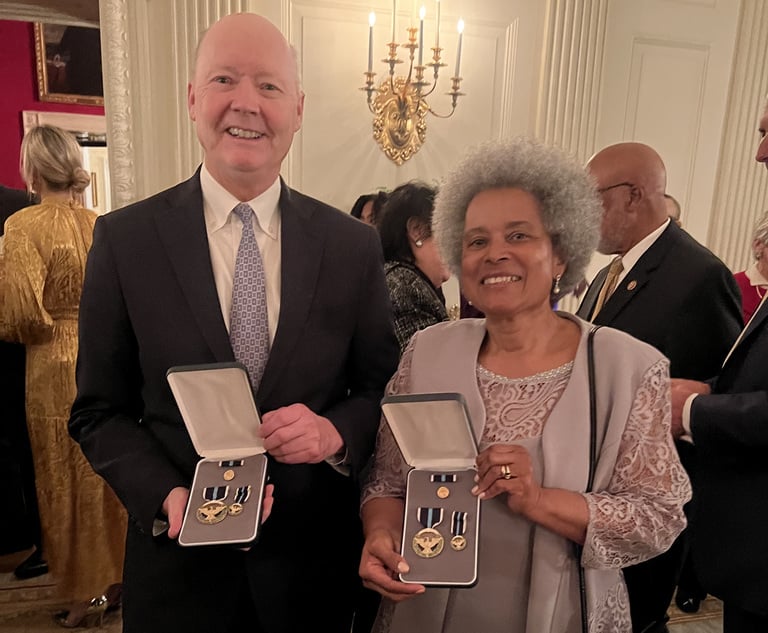Glenmark Says Mylan Infringement Suit Violates Antitrust Laws
A Delaware patent infringement case has erupted into an antitrust dispute, after an India-based generic drugmaker accused Mylan Pharmaceuticals of using its lawsuit to stifle competition for its topical foam acne treatment.
March 13, 2018 at 07:23 PM
3 minute read

A Delaware patent infringement case has erupted into an antitrust dispute, after an India-based generic drugmaker accused Mylan Pharmaceuticals of using its lawsuit to stifle competition for its topical foam acne treatment.
Glenmark Pharmaceuticals on Monday urged a federal judge in Wilmington to greenlight its counterclaims that Mylan had filed “sham litigation” in order to delay approval of a generic version of Evoclin, which is used to treat acne in teenagers and adults.
The lawsuit, Glenmark said in a court filing, was designed to trigger an automatic stay under the Hatch-Waxman Act that would keep Glenmark's product off the market for at least 30 months, while the infringement case is litigated.
“Mylan's infringement action is both objectively and subjectively baseless and, for purposes of this motion, undisputably motivated by anticompetitive intent,” attorneys for Mumbai, India-based Glenmark and its American subsidiary said.
Mylan, whose global headquarters is in Canonsburg, Pennsylvania, sued Glenmark for infringement in November. It has refuted Glenmark's monopolization claim in court filings as a “hurriedly cobbled together set of conclusory allegations which must be dismissed.”
A spokeswoman for Mylan was not immediately available to comment on Tuesday.
In its Nov. 15 complaint, Mylan said that Glenmark's planned generic infringed two patents covering clindamycin phosphate, Evoclin's active ingredient.
Glenmark, however, responded that its product does not include a base, which is required by each of Mylan's patents in order to balance Evoclin's pH levels without upsetting the active ingredient. The company argued that Mylan was aware of the differences between the two treatments, but pushed ahead with its infringement suit anyway in an attempt to maintain its grip on the market for treatment with topical clindamycin foam.
Mylan asked U.S. District Judge Richard G. Andrews of the District of Delaware to dismiss the monopolization counterclaim last month, saying there was nothing to support the “bald assertion” that its acne treatment constituted a market unto itself.
On Monday, Glenmark stood by its reasoning that Mylan had the power to control prices and exclude competition, arguing that Evoclin lacked any directly competitive companies trying to sell an identical product.
“While other forms of topical clindamycin products are available on the market—in the form of gels, lotions and solutions—the '237 and '747 patents disclose that foam products offer advantages particularly relevant to the treatment of acne,” the company said.
In addition to the antitrust claim, Glenmark has argued that Mylan's patents are invalid and cannot be infringed.
The case, filed in the U.S. District Court for the District of Delaware, is captioned Delcor v. Glenmark Pharmaceuticals.
Mylan is represented by David E. Moore, Bindu Ann Palapura and Stephanie E. O'Byrne of Potter Anderson & Corroon and Alissa M. Pacchioli, Deepro R. Mukerjee, Derek S. Neilson, Jitendra Malik, Joseph M. Janusz, Lance Soderstrom and Stephanie M. Roberts of Alston & Bird.
Glenmark is represented by Claire A. Fundakowski, Kathleen B. Barry and Maureen L. Rurka of Winston & Strawn and Dominick T. Gattuso of Heyman Enerio Gattuso & Hirzel.
This content has been archived. It is available through our partners, LexisNexis® and Bloomberg Law.
To view this content, please continue to their sites.
Not a Lexis Subscriber?
Subscribe Now
Not a Bloomberg Law Subscriber?
Subscribe Now
NOT FOR REPRINT
© 2025 ALM Global, LLC, All Rights Reserved. Request academic re-use from www.copyright.com. All other uses, submit a request to [email protected]. For more information visit Asset & Logo Licensing.
You Might Like
View All
Delaware Legal Figures Who Played Key Roles in Ending School Segregation Honored With Presidential Citizens Medal
3 minute read


Chancery Claims Linking Fox Management to Defamation Liability Clear Hurdle
4 minute readTrending Stories
- 1The Appropriate Exemption in Students for Fair Admissions v. President & Fellows of Harvard College
- 2DOJ, 10 State AGs File Amended Antitrust Complaint Against RealPage and Big Landlords
- 3New Partners at Cummings & Lockwood, Carmody Torrance Sandak & Hennessey
- 4'Extra Government'?: NY Top Court Eyes Ethics Commission's Constitutionality
- 5South Texas College of Law Houston Selects New Dean
Who Got The Work
Michael G. Bongiorno, Andrew Scott Dulberg and Elizabeth E. Driscoll from Wilmer Cutler Pickering Hale and Dorr have stepped in to represent Symbotic Inc., an A.I.-enabled technology platform that focuses on increasing supply chain efficiency, and other defendants in a pending shareholder derivative lawsuit. The case, filed Oct. 2 in Massachusetts District Court by the Brown Law Firm on behalf of Stephen Austen, accuses certain officers and directors of misleading investors in regard to Symbotic's potential for margin growth by failing to disclose that the company was not equipped to timely deploy its systems or manage expenses through project delays. The case, assigned to U.S. District Judge Nathaniel M. Gorton, is 1:24-cv-12522, Austen v. Cohen et al.
Who Got The Work
Edmund Polubinski and Marie Killmond of Davis Polk & Wardwell have entered appearances for data platform software development company MongoDB and other defendants in a pending shareholder derivative lawsuit. The action, filed Oct. 7 in New York Southern District Court by the Brown Law Firm, accuses the company's directors and/or officers of falsely expressing confidence in the company’s restructuring of its sales incentive plan and downplaying the severity of decreases in its upfront commitments. The case is 1:24-cv-07594, Roy v. Ittycheria et al.
Who Got The Work
Amy O. Bruchs and Kurt F. Ellison of Michael Best & Friedrich have entered appearances for Epic Systems Corp. in a pending employment discrimination lawsuit. The suit was filed Sept. 7 in Wisconsin Western District Court by Levine Eisberner LLC and Siri & Glimstad on behalf of a project manager who claims that he was wrongfully terminated after applying for a religious exemption to the defendant's COVID-19 vaccine mandate. The case, assigned to U.S. Magistrate Judge Anita Marie Boor, is 3:24-cv-00630, Secker, Nathan v. Epic Systems Corporation.
Who Got The Work
David X. Sullivan, Thomas J. Finn and Gregory A. Hall from McCarter & English have entered appearances for Sunrun Installation Services in a pending civil rights lawsuit. The complaint was filed Sept. 4 in Connecticut District Court by attorney Robert M. Berke on behalf of former employee George Edward Steins, who was arrested and charged with employing an unregistered home improvement salesperson. The complaint alleges that had Sunrun informed the Connecticut Department of Consumer Protection that the plaintiff's employment had ended in 2017 and that he no longer held Sunrun's home improvement contractor license, he would not have been hit with charges, which were dismissed in May 2024. The case, assigned to U.S. District Judge Jeffrey A. Meyer, is 3:24-cv-01423, Steins v. Sunrun, Inc. et al.
Who Got The Work
Greenberg Traurig shareholder Joshua L. Raskin has entered an appearance for boohoo.com UK Ltd. in a pending patent infringement lawsuit. The suit, filed Sept. 3 in Texas Eastern District Court by Rozier Hardt McDonough on behalf of Alto Dynamics, asserts five patents related to an online shopping platform. The case, assigned to U.S. District Judge Rodney Gilstrap, is 2:24-cv-00719, Alto Dynamics, LLC v. boohoo.com UK Limited.
Featured Firms
Law Offices of Gary Martin Hays & Associates, P.C.
(470) 294-1674
Law Offices of Mark E. Salomone
(857) 444-6468
Smith & Hassler
(713) 739-1250






